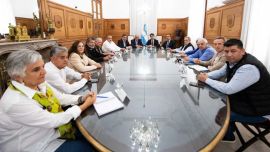Two public figures swimming against the current of vehemence dominating the run-up to the October presidential election chose to use words this week with intrinsically related meanings as they described the challenge the country faces: legitimacy and trust.
Supreme Court Chief Justice Carlos Rosenkrantz was talking about the courts he leads in the formal opening of this year’s judicial year. “We are suffering from a severe crisis of legitimacy… a crisis of trust,” he said.
Elsewhere, former economy minister Roberto Lavagna, one of the political stars of the moment, said a day later that nothing will work in Argentina unless there is “trust.” Speaking in Córdoba, he added: “Without public trust, no economic programme works.”
Lavagna knows what he is talking about – which does not mean he can deliver. When he took charge of the country’s economy in 2002, Argentina was struggling to emerge from a major crisis. Lavagna and later Néstor Kirchner, when he was sworn in as president in May, 2003, are widely credited with helping the country surf through that deadlock, triggered by three years of recession, a freeze on bank deposits and a massive devaluation that pushed half the country below the poverty line.
Trust was, of course, broken. On the road to the crisis, the country’s political and economic establishment were in a state of denial, at least when speaking publicly, about the country’s real problems. Only after they had exploded, one-by-one in that tragic December of 2001, were they able to name those problems: debt default, devaluation and the one-peso-one-dollar currency peg that epitomised the economic epoch of the 1990s.
How far is today’s Argentina from that meltdown? Obscurantism is beginning to dominate, and the establishment is again unable and/or unwilling to be clear in public about the challenges the country will be facing the day after Argentina’s new president takes office on December 10.
Argentina is entering its a second year of recession, inflation is stubbornly high, the country has again accrued enough debt that it is starting to look unsustainable, the world’s financing sources (save the IMF) are closed, and the Central Bank is walking on a tight-rope between the precipices of crippling interest rates and unruly runs on the peso. Significant growth of any sort is now only on the distant horizon.
To be fair, perhaps we should not blame President Mauricio Macri for stating during a television interview last Sunday evening that he didn’t like his job that much. But his response prompts an inevitable follow-up question: why would he want to keep it for another four years? “I am fuming,” the president added on Thursday in a speech to fellow officials, referring to people who he said “lie” about the state of the country.
His sworn political enemy, former president Cristina Fernández de Kirchner – who flew back to Buenos Aires yesterday from Cuba, where she visited her daughter Florencia Kirchner, reportedly in bad health – is also fuming too, complaining about “political persecution” as she mulls a big decision in the coming weeks: will she launch the third presidential bid of her lifetime? The previous two in 2007 and 2011 were easy calls, because they were piece-of-cake victories. But it’s not like that anymore.
If the two persevere with their races, and if Argentines stick to their own fuming, polarised, anti-something voting mood, the country is likely to remain in trouble next year, replete with a side dish of reloaded economic hardships. If Macri and Fernández de Kirchner face off in a narrow second round, whoever wins will have little steam to help steer the country politically through what look to be choppy waters ahead. Anger and disenchantment feed each other well.
As the 2015 election showed, Argentines are less polarised than their leadership. The political system has not blown up in the air – yet – as it has done in other Western democracies trapped in a combo of economic trouble, fake news and shortcut solutions. You name it: Donald Trump’s victory, Britain’s Brexit, Brazil’s Bolsonaro. In Argentina 2019, in one corner, some postulate that the IMF is the only way and that corruption alone has ruined the country. In the other, they declare that corruption is a court fabrication and that Macri is the leader of a perverted plan of class warfare designed to further impoverish the poor. Both seem to be surviving to fight another political day. But perhaps just one more.
Behind closed doors, the political and economic establishment agrees that polarisation is only driving the country to a new sort of dead-end disaster. But it is not clear if there is enough time and political stamina to build an alternative. Most of these are playing the Lavagna card, though it is one not even Lavagna has fully played yet. If it fails, the public will lose what little trust they have left, sooner rather than later.
Armies, as Napoleon once said, ultimately march on their stomachs.
























Comments